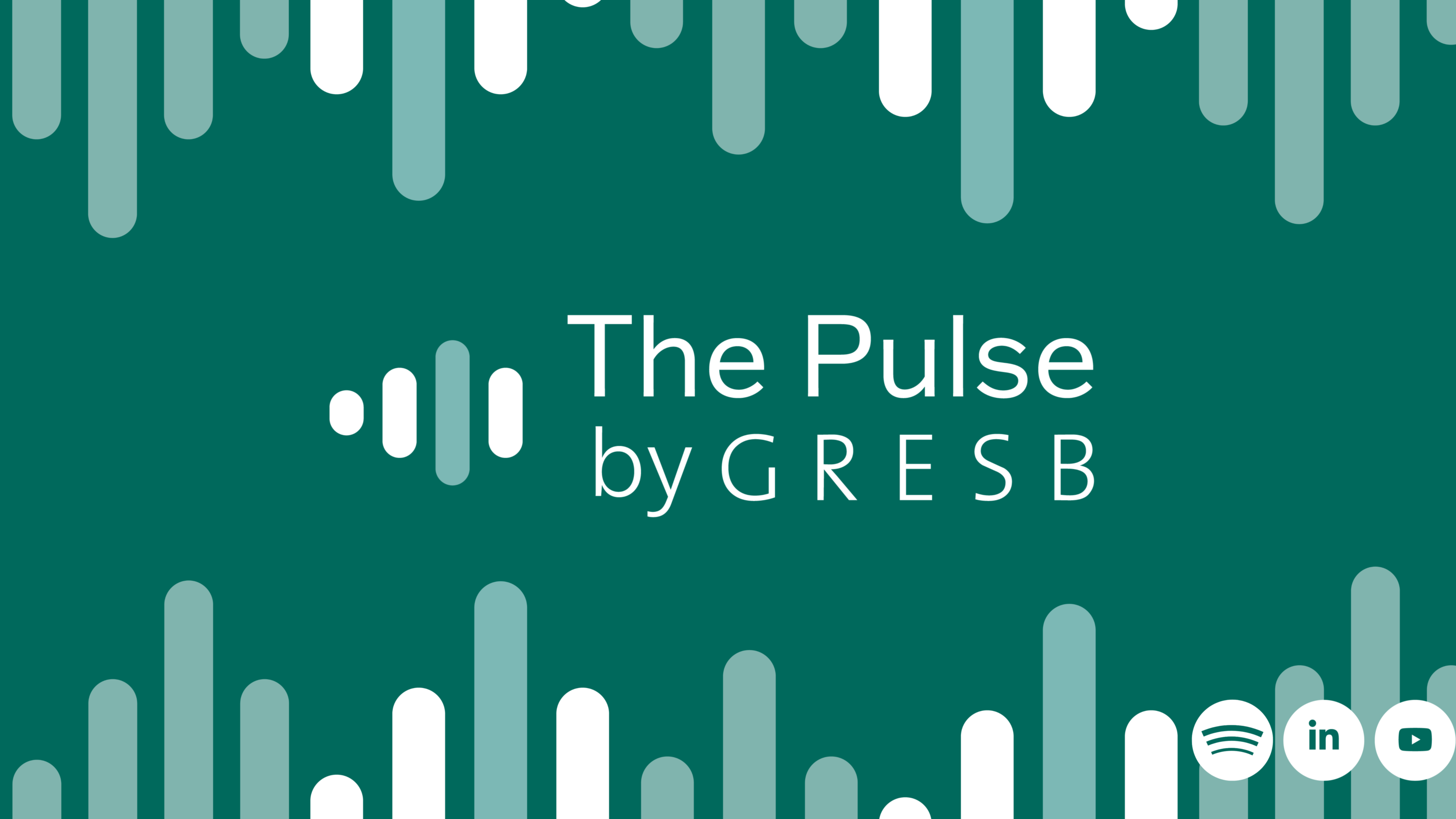
The Pulse by GRESB
The Pulse by GRESB is an insightful content series featuring the GRESB team, partners, GRESB Foundation members, and other experts. Each episode focuses on an important topic related to either GRESB, ESG issues within real assets industry, decarbonization efforts, or the wider market.
- Watch on Youtube
- Listen on Spotify
- Listen on Apple Podcasts
From tenant surveys to success: Data-driven decisions in Commercial Real Estate
In this episode of The Pulse by GRESB, our speakers explore the critical role of tenant satisfaction in commercial real estate. They dive into the nuances of how tenant feedback, gathered through surveys, directly influences property value and tenant retention. Listen to the episode featuring:
Transcript
Can’t listen? Read the full transcript below. Please note that edits have been made for readability.
Reid: Welcome to the Pulse Podcast by GRESB. My name is Reid Morgan, Member Relations Manager in the Americas region. And today I’m joined by Jen Tindle of Kingsley Surveys, a product by Grace Hill. Jen, good to have you.
Jen: Thanks, so glad to be here.
Reid: Awesome. We are going to spend a little time today talking about tenant satisfaction. And you’re uniquely suited to speak about this. Tell us a little bit about yourself, your company, and why this topic is relevant for you.
Jen: Sure, Reid, I’d be happy to. Thanks again for having me. So like Reid said, my name is Jen Tindle, and I am the VP of Strategic Insights at Grace Hill, which has the Kingsley Surveys product. My job is just a combination of things. It’s not any one particular job, as you might have guessed from the title, which is a bit vague. So I do strategy, product, partnerships, but the most relevant part of my job for our conversation today is about creating insights from data. A lot of the data that we use is from Kingsley surveys. So if you haven’t heard of Kingsley Surveys, we’re a tenant and resident satisfaction survey provider. We survey over 7. 3 million residents and two and a quarter billion square feet of commercial properties each year. So it’s a ton, ton of surveys going out. And if you weren’t aware, tenant and resident satisfaction surveys do increase your GRESB score, which is part of why we’re a partner with GRESB and beyond just believing in their mission.
Reid: Wonderful, thank you for that context. So understanding how a resident or a tenant thinks about or feels in their space is critical and yes, GRESB asks for these questions, asks for these surveys to happen so that there’s an understanding of what’s going on in the building. And so that’s a lot of square footage, that’s a lot of residents, uh, you, you’re certainly, well positioned in the market as you tackle this issue of hearing from tenants.
So I want to dive in with kind of a level setting question here, around tenant satisfaction and its role in commercial real estate. Obviously understanding your tenants has always been important and as long as there have been landlords and tenants that dynamic has existed.
Reid: So tell me from your organization’s perspective, how has tenant satisfaction become such a critical focus in commercial real estate over the course of the history of your company?
Jen: Yeah. I mean it’s, always been a focus, like, for the 35 years that Kingsley Surveys has been around. And that’s because there’s really no other way to know what your tenants are thinking. There isn’t some large scale review platform like Google reviews or apartments.com for the commercial side of the space. So you really need a survey or just some form of communication with your tenants to understand how you can improve.
And we’ll talk about this later. I know. We have it on the docket to talk about how tenant satisfaction does directly correlate to value. And that is why people have been doing surveys so long is because they recognize the importance of having a survey. And that if you know which tenants, for example, are at risk of not renewing earlier, you can catch that ahead of time versus being after the fact, and then it’s too late. You can also make improvements early on. I have a colleague who’s a SVP of property management in the space. And one thing that she often talks about is that a lot of her tenants do something called silent suffering, where they just don’t communicate with anyone about what they don’t like, and they don’t say anything until they’ve already made a decision to move. And the survey is that intermediary that steps in there and works with your tenants or your residents to understand if there are any problem areas so that you can then go fix them before it’s too late.
Reid: I like that. Solving silent suffering. There you go. That’s clever. And that leads me to this next thought of, especially in a market where every decision, every investment is scrutinized to ensure that it is connected to an increase in value or an increase in ROI or really tying out to the value of the asset. We understand that tenant satisfaction can directly influence a property performance, and ultimately the portfolio value. How does it do that?
Jen: It definitely does correlate directly to tenant retention. So if you have tenants who are satisfied, they are more likely to renew their leases. And if they’re more likely to renew their leases, then you have lower turnover costs. You don’t have those long vacancy periods, whether it is a tenant or a resident. And then the other bonus point is that if you have happy tenants and residents, they’ll talk about it. They’ll post on social media, on the multifamily side, or on the commercial side, they could give you a higher satisfaction score.
And something you may not know, Reid, is that with Kingsley Surveys, we actually give out Excellence Awards. So the properties that have the highest satisfaction win these awards and they can use it to market their properties. And I’m actually hosting a webinar in a few weeks, really excited about it, because our guest takes the survey scores along with property metrics like financials and other data to create just overall performance scores for her properties, and then she ranks them and rewards the property management teams every year. And it’s not just the top properties that win every time. It’s also which ones were most improved, which I think is a really fantastic way to incorporate tenant satisfaction to making sure that your properties are performing both financially, but also those objectives that influence the financials. And then last, I did want to mention, real quick Reid, because I am working on a GRESB Insights blog, so this is a little bit of a spoiler alert.
Reid: Alright, nice.
Jen: Yeah, exactly, so we compared survey responses about sustainability specifically to the intent to renew survey responses. And we actually saw a huge increase in renewal probability if that resident was also highly satisfied with sustainability. So sustainability and intent to renew actually go hand in hand and drive value the same way. So I’m really excited to share this with you soon.
Reid: I like that. That’s really nice. I feel like that’s one of the challenges in this industry of really being able to tie some of the things that we may intrinsically know are valuable or important, or we may feel, you know, in our guts. We’re like, yeah, this is a good thing, but how do we tie that directly to, like we were talking about, value, ROI, you know, retention, that kind of thing.
That’s a really nice correlation. Excited to see that. Alright, so let’s jump into some of the challenges around tenant satisfaction, around surveys, around gathering this information. It’s obviously not a cakewalk. Getting people to respond, getting authentic, true answers, really getting insight out of this process can be difficult. So, tell me a little bit about some of the challenges you’ve seen that property owners face in getting this information and then doing what they need to do with it, really meeting the tenant expectations.
Jen: Right, so in terms of the challenges with getting this information, we’ve seen different tactics depending on multifamily or commercial. I mean, you can incentivize survey responses as long as you don’t incentivize them to be positive, right? There was some recent actions around that. There’s also just the communication piece of letting them know, hey, we’re about to do a survey. And that is actually one of the top three highest correlations with overall satisfaction that we see.
So when you’re talking about what do you do and what are the challenges with doing something about your survey results, the top three most highest correlated areas with overall satisfaction are Satisfaction with Management, Management’s Problem Resolution, and Management Communication. So there was a really cool visual we put together for our last commercial webinar, which was by property type, so medical office, office, retail, industrial. And we showed how very few tenants, like one to four percent, ever preferred to not be checked in with. So they said they want zero management communication. But the crazy and horrifying thing about this visual was that like, 11 to 22 percent of tenants said they were never checked in with at all in the course of 2024. So it’s a huge miss, but it’s super simple to fix. You don’t have to buy a new app or install some new product. You literally just make a phone call, send an email. Say hello to your tenants, ask how they’re doing, see if you can make their day better. It’s simple, but it’s actually the most effective way to increase tenant satisfaction.
Reid: Yeah, yeah, that makes a lot of sense. I think of a common phrase of you know, for a lot of things in this life, it’s simple, but it’s not easy. So that leads me to maybe a devil’s advocate question here. Let me throw this situation out there and tell me what you think. I’m a property manager. Maybe I think I can kind of guess at what my tenants need. You know, they probably could enjoy this or they would like this more. So I’m just going to kind of go off my hunch that these are the things that probably will be most appreciated or enjoyed by my tenants. What’s the risk in doing that? What might I be missing if I’m not really getting right from the tenants, what they’re thinking, what they’re feeling, what their survey results are? How can I make informed property improvements if I don’t have that information versus if I did?
Jen: You know, that reminds me, I’m guilty of doing the same, of just going off of gut intuition. I do it all the time. Something my dad always told me growing up, was, do you know what the word assume means, Jennifer? Which you’ve probably heard that reference. I’m not going to repeat it because I don’t want this podcast to get delisted. In case that’s not allowed, but you, you can’t really assume unless you have evidence. So that’s why data, like from surveys, is so important. And for the reasons I mentioned earlier, you really have no other feedback mechanism, especially on the commercial side. And even on the multifamily side, it’s not going to be as honest of feedback as you’ll see from websites. So that’s really the key thing there.
Reid: Yeah, that makes a lot of sense. So, so another scenario, I’m listening to this podcast. I manage some properties. I don’t really have much of a strategy going right now around tenant engagement. How should I get started?
Jen: The first and easiest thing if you want to know what your tenants want is just to go ask them. I always advocate for that. At the end of the day, just go have a conversation with your tenants. That should be your first step, no matter what. And the other really critical thing that we do is that we provide a benchmark for our customers. So that way they know if they are, let’s say that we talked about those areas that are problem areas for a lot of folks, communication, for example. So if your property management team’s communication score was low, perhaps it’s still higher than your competitors. Obviously you should work on improving it no matter what, but it is important to know how you stack up.
Reid: Now that’s very resonant with the way that GRESB has kind of approached this, you know, best in class and industry leading performance. Certainly, there are metrics that are on an absolute scale, kind of hard to interpret. But on a relative scale with market insights into what peers or competitors are doing, can really provide some valuable takeaways on what’s going on in the industry, what someone might find if they were to move to a different building owned or run by someone else. That market insight seems really interesting. How have you seen your clients and customers use that feature from Kingsley surveys?
Jen: I mean, you guys are the benchmark, so, for sustainability, so thank you for being that example for everyone. I’d say what insights aren’t actionable right off the bat. All of them can be, but I’m just teasing here. But seriously, there’s just so much substance in survey responses. Like I said, we want you to survey with us, but no matter what, you should be doing these tenant and resident satisfaction surveys because they’ll tell you what areas you’re doing well in. Like, maybe you have an awesome package delivery service, or your restrooms are always well taken care of, or maybe you need to know whether your industrial tenants will share utility data with you, and you feel it’s easier to have a third party ask than you being the one to have that first confrontation. Or maybe your elevator keeps breaking and your maintenance team is slow to respond, and that is what’s causing your tenants not to renew, but you wouldn’t know that necessarily unless you could actually see those correlations with your tenant responses.
So I would just say that the big takeaway here is that tenant satisfaction is driving your property level success, your property value, in the same way that sustainability can too. This is what I’ll leave you with. Happier tenants who want to renew will positively impact your bottom line, but you won’t know what you need to do to keep them happy unless you survey them.
Reid: There you go. That’s about as direct as a correlation. I love that. I’ve heard a comment out there that there is no such thing as bad news, only late news. And that kind of makes me think here, you know, after a tenant has not renewed, that’s not when you want to find out that there was something that was problematic. You want to know that before so you have a chance to fix it. Then when renewal conversation comes up, you’re in a better position. That’s really great. And, Jen, thank you so much for taking the time today to walk us through this. It’s very clear Kingsley Surveys, are really well established in getting this information, working with property managers and owners to help them really understand their tenant sentiment, and providing that data, that market insight, and that valuable resource to help improve the tenant experience across all their properties.
Jen: Awesome. Thank you, Reid. Appreciate it.
Reid: Thank you all for joining us on this episode of The Pulse. Have a great rest of your day.

